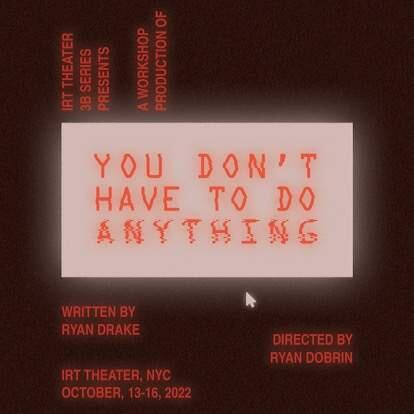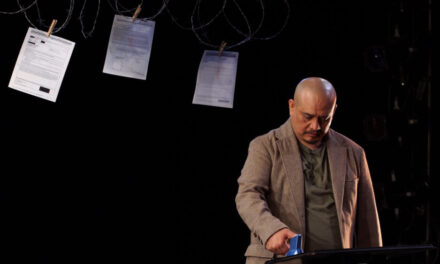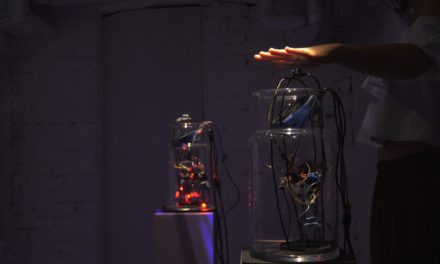What happens when intimacy becomes tainted? And what does that mean for a young queer person exploring both their newfound sexuality and a burgeoning online world? You Don’t Have to Do Anything tells a story around identity and trauma that’s equal parts emotional and witty. The play will enjoy a workshop production from October 13th to 16th at IRT Theater in New York City.
Written by Ryan Drake and directed by Ryan Dobrin, this production of You Don’t Have to Do Anything has evolved from previous iterations as it prepares for a full run in the future. I spoke with the two Ryans about the play, its themes, and the workshop production, which will see the play on its feet in three dimensions for the first time.
You Don’t Have to Do Anything introduces Teddy, who brings audiences back to his 7th-grade experience attending a new private school. Worried that he won’t fit in with the wealthier classmates, Teddy finds friendship with Clark, a student seemingly from a similar background. But Clark has his motives, and a series of incidents lead to him being expelled from school as Teddy comes to terms with his identity.
The play unfolds over the next decade as Teddy explores his sexuality through the early chat rooms of the 21st century, finding both companionship and danger. His online interactions bring Clark back into his circle as the two young adults test the waters of the online world, their sexualities, and each other. Compared to other coming-out narratives, Drake describes it as “a love story where there is no love.”
You Don’t Have to Do Anything is one of many memory plays reflecting on past events that shaped a person’s identity. Drake drew influence from Paula Vogel’s How I Learned to Drive, another play about reflecting on abuse years later. Yet the concepts of “You Don’t Have to Do Anything” provide unique relevance to our current times. The play arrives several years away from the days of figuring out AIM chat rooms, but close to a pandemic that forced many interactions into the online sphere. Drake believes this play comes at the right time for critical distance and relevance, saying, “It’s about a particular time of the internet. But we needed some years of trying to understand how the internet works. How it worked then, and how it works now.”
Drake wrote the play back in 2018, hammering it out over the course of just three days while at a cousin’s wedding. In the hotel room with his parents, Ryan was “just feverishly typing; I was like, ‘This is the play, and I need to write it all now,” he laughs. The play enjoyed a reading that year and a digital workshop in 2020, and will soon arrive for its first production next month. “The topics of it now feel more prevalent than they did in 2018,” Drake says.
So how did the play come about? While directing a short film with several gay actors, Drake discussed going on chat rooms as a teenager. He found that other cast members had similar experiences of these chat rooms as “the wild west” but that “we didn’t know that it was like a universal experience of queerness.” Drake had initially written the character of Clark for another play but moved him to this one. For the sections in middle school, he drew from his own experiences for how young Teddy would act and speak.
And in drawing from some of his own middle school experiences, Drake used the opportunity of the first reading to flesh these out. “When you’re writing about yourself, you can jump from A to C because you have context for your life because you’ve lived it. And then someone reads it… and they don’t have the [context] because they aren’t spending every day of their life with you.” For the 2020 one, he developed the supporting character of Enid and the ending. After the online workshop in 2020, he briefly considered changing the narrative to take place entirely online but decided against it. Still, the pandemic highlighted what it means “to build a relationship with someone completely online,” Dobrin adds.
As for the play’s director, Ryan Dobrin read You Don’t Have to Do Anything while working at a theater and found the new work exciting. In a fortuitous turn of events, Ryan Drake asked a friend for directors they knew, and Dobrin’s name came up. Drake had never worked with a queer male director before and found that it made it easier to communicate the play’s themes, explaining, “There’s a shorthand that exists.” Likewise, Dobrin appreciates the understanding of online sexuality at play “that only was exacerbated in the pandemic where no one was allowed to actually kiss.”
Aside from staging the play on its feet in a three-dimensional space for the first time, the upcoming production will also feature various design elements. Carsen Joenk serves as sound designer, Bentley Heydt and Molly Tiede-Schroer provide lighting design, and Cat Raynor provides production design, including costume and scenic design. The cast consists of Yaron Lotan as Teddy, Will Dagger as Clark, Sinclair Daniel as Enid, and Tim Creavin as the ensemble. In directing this production, Dobrin has thought about “what the audience experience will be” and how the space allows for audience members to get various perspectives. “It’s so clear to us, especially for Teddy, what the emotional life is,” he explains, but that other characters might feel something that’s different from what they’re typing. Dobrin has worked to clarify perspective amid this duality and takes inspiration from the work of director Taylor Reynolds in “guiding audiences into uneasiness or a sense of uncertainty, while the things on the surface [don’t feel that way].”
Though the play has moments of wit and cleverness, its narrative also deals with some difficult themes. Drake describes You Don’t Have to Do Anything as showing sexual assault and abuse in the way popular media portrays it, but also in ways that the media don’t commonly consider it. As such, the digital program for the workshop will contain links to mental health resources. The production team hopes that for a future full-scale production, performances can have aftercare, including talks with a mental health professional as well as a partnership with a mental health organization such as Callen-Lorde.
For the upcoming workshop production this October, the Ryans and producers Leigh Honigman and Joey Nasta see this as a chance for audiences to see a play about memory and agency that will give a unique perspective for audiences who have explored online relationships, particularly queer ones. They also hope to gather community support for the more large-scale production down the road.
Playing at IRT Theater, the production offers ticket prices based on need, with $30 for pay-it-forwards pricing, $20 for general admission, and $15 for need-based pricing. But the creators want to make sure the play reaches its intended audience. Honigman stresses that if price is a barrier to entry, folks may reach out at youdonthave2doanything@gmail.com for assistance. The production team offers a unique code for readers who purchase in advance. They may use the discount code THETHEATRETIMES for 20% off the price of online tickets.
Tickets for You Don’t Have to Do Anything may be purchased here online or in person at the 154 Christopher Street box office for Thursday, October 13th, Friday, October 14th, Saturday, October 15th, and Sunday, October 16th.
This post was written by the author in their personal capacity.The opinions expressed in this article are the author’s own and do not reflect the view of The Theatre Times, their staff or collaborators.
This post was written by Andrew Agress.
The views expressed here belong to the author and do not necessarily reflect our views and opinions.


















